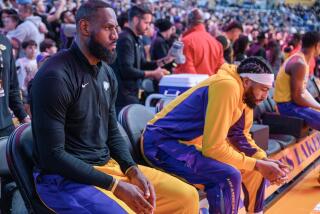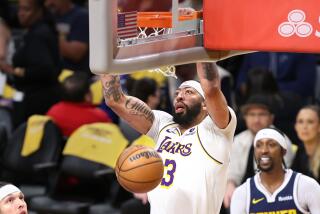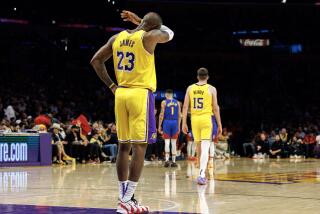Lakers Glad to Be Finished With Rockets
- Share via
Magic Johnson exaggerated the gesture, slowly running his right hand across his brow, then flicking off imaginary sweat and exhaling deeply in relief.
Yes, Johnson wordlessly confirmed, the Lakers are happy to be rid of the Houston Rockets and on to the best-of-seven Western Conference semifinal series against either the Phoenix Suns or Utah Jazz.
Unlike other first-round opponents the Lakers have swiftly dispatched in the last seven playoffs, Houston made the Lakers work. It was not, as in previous seasons, almost a bye into the second round. The Lakers had to come from behind twice and lost a game before blowing out the Rockets in Game 4 Thursday night.
Not since 1980-81, when Houston eliminated them in a mini-series, have the Lakers experienced such competition in the first round. Led by Akeem Olajuwon, arguably the NBA’s best center, the Rockets may be the most physical team the Lakers will face in the Western Conference during the playoffs.
Other teams, especially the fast-breaking Suns, will provide other problems--and definitely a faster pace--for the Lakers. But the Lakers were acutely susceptible to Houston’s rugged style of play and vulnerable to the matchup problem at center, with Olajuwon, and at guards, where Houston ran two small, quick players at the bigger Laker backcourt.
“We may play tougher teams, but there isn’t going to be a series any more physical than (the Houston) series was,” Laker Coach Pat Riley said. “Maybe not even if we make it to the finals. I don’t know if we’ll face the same size problem again. Akeem and Otis (Thorpe) caused a lot of problems. We don’t have to worry about that now.”
Any pretense of the Lakers’ usual nonchalance after winning a first-round series was abandoned after their 109-88 victory at the Summit on Thursday night.
Johnson cracked his first smile in a week. Vlade Divac blew a kiss to the bench after sinking a three-point shot late in the game. James Worthy even showed some emotion.
“Akeem is behind us now,” Johnson said, shaking his head. “He and Otis Thorpe, thank goodness we don’t have to play them anymore. That’s a lot of power up front that you have to do something to stop. After this, any team we play now will be more of a finesse team.”
By comparison, sure. But center Mychal Thompson predicted that the Lakers would have to adopt the same physical style against Phoenix, to control its running game; or Utah, to stop Karl Malone and Mark Eaton.
“We’re going to start practicing (today) for the next series, and we know it’s going to be played just as physically,” Thompson said. “Phoenix has that deep bench you’ve got to contend with. You have to play Phoenix strong.
“This series (against Houston) was a good test for us. We won’t see one guy like Akeem, but everybody plays physical in the playoffs.”
Worthy said the difficult series against the Rockets had been good for the Lakers, that their energy had increased in the four-game series.
“We’ve never had to work this hard in the first round,” Worthy said. “Now, we’re ready to play, we’re into it.”
The Lakers said they prefer to play again as soon as possible. They did not say which team they preferred, but a Sunday start would mean Phoenix is the opponent.
“Too many days off is not good,” Worthy said. “We just want to get back home and get ready.”
Riley said that nearly a week off between the regular season and the playoffs might have contributed to the Lakers’ slow start against Houston.
“Early, we were sluggish,” Riley said. “I don’t think there was any doubt the layoff affected us. James and Buck (Johnson), especially, really felt it. I think it took (Johnson) two games to really get into it.
“I’d like to play Sunday. We’re too old to take too much time off. Three or four days maximum would be best.”
Laker players seemed eager simply to face any team other than the Rockets.
Johnson, perhaps more than anyone, will not miss them. Vernon Maxwell used quickness and strength to hobble Johnson in the open court. And, when Johnson moved to the low post, Maxwell got defensive help. So Johnson, essentially, became a passer.
He averaged 19 points, second highest on the team, 13.3 assists and seven rebounds. But Johnson shot 47.3% and averaged four turnovers.
“Sometimes, you sacrifice your own game for the good of the team,” Johnson said. “Next series, who knows, might be my series. You try to play the way they allow you.”
Byron Scott, who began the Houston series having missed the previous nine days because of a left ankle sprain, started slowly but improved. He averaged 13.8 points and shot 46.6%. But he made 42.9% of his three-point attempts and led the Lakers with 2.8 steals a game.
The Laker bench, mostly reduced to a three-man substitution rotation, compensated offensively for the diminished scoring by some of the starters.
Forward Orlando Woolridge averaged 12 points and shot 56% in 22.8 minutes of play. Divac, used in place of Thompson in the fourth quarters, averaged 10 points and 4.8 rebounds, made 14 of 17 shots and did not back down against Olajuwon.
Worthy, however, was the only consistently productive Laker in the series. Despite being double-teamed the last two games, he averaged 28 points, second to Michael Jordan among NBA playoff scorers. He shot 64%, and averaged 3.8 assists and two steals.
But even Worthy found the going rough.
“It was a tough series,” he said. “These were the kinds of games you usually see in the finals, not the first round.”
More to Read
All things Lakers, all the time.
Get all the Lakers news you need in Dan Woike's weekly newsletter.
You may occasionally receive promotional content from the Los Angeles Times.






